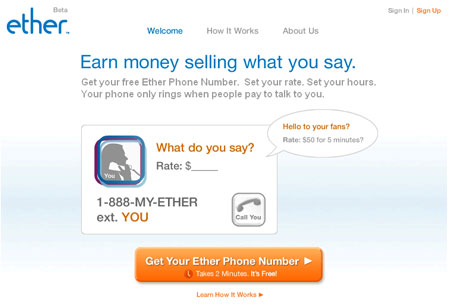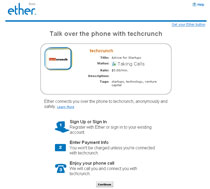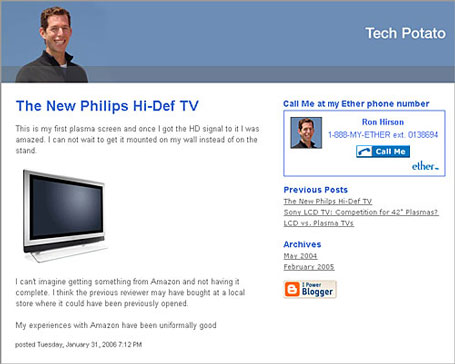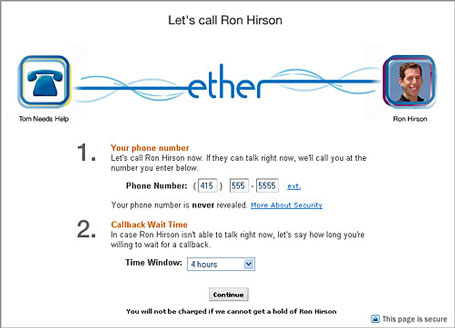 Tonight at midnight the doors open (to beta testers) at Ether, the new super-stealth startup that is wholly-owned by the pay-per-call folks at Ingenio.
Tonight at midnight the doors open (to beta testers) at Ether, the new super-stealth startup that is wholly-owned by the pay-per-call folks at Ingenio.
The concept of Ether is straightforward, but it has a massive back end infrastructure (thankfully Ingenio already had it built). They call it an “ebay for services”, allowing people to charge for advice over the phone (and by email – more on that below).

Service providers set up an account by providing some personal information and a phone number that they would like to be called at. Any service that can be provided over the phone is a perfect match for Ether. “Sellers” set their price, from free to anything (on a per minute or per hour basis). They can tell Ether the hours they are willing to take calls. Every seller is issued a toll free phone number (with a dedicated extension), which forwards to their phone.
 Buyers can search through providers, see prices, feedback, etc. Once they agree to terms, they can place the call. Sellers only get calls once a Buyer has paid the fee and agreed to the terms.
Buyers can search through providers, see prices, feedback, etc. Once they agree to terms, they can place the call. Sellers only get calls once a Buyer has paid the fee and agreed to the terms.
Ether takes a flat 15% of fees for its trouble. They cover long distance charges and credit card processing fees out of this 15%.
And the fun doesn’t stop there. Sellers can also sell any type of digital content through Ether as well. The buyer is able to access the content only after paying the agreed upon fee. This content can be emailed out to people, or accessed via a link/badge that can be placed on a website.
The combination of phone advice, plus the ability to charge for digital content, opens up all kinds of possibilities. At first glance, I saw this as a kind of Web 2.0 elance…but after testing out the service its clear that it goes way beyond what previous services in this space did. Ether brings people together directly via calls or email, and sets up a great billing mechanism in between the parties. I expect Ether to ramp quickly towards success, and it will be extremely hard for competitors to enter the space given the capital intensive infrastructure needed to do something like this.
See Robert Scoble on Ether as well, who met with the team last week and asks “Anyone have any ideas of how they’d use Ether?”

